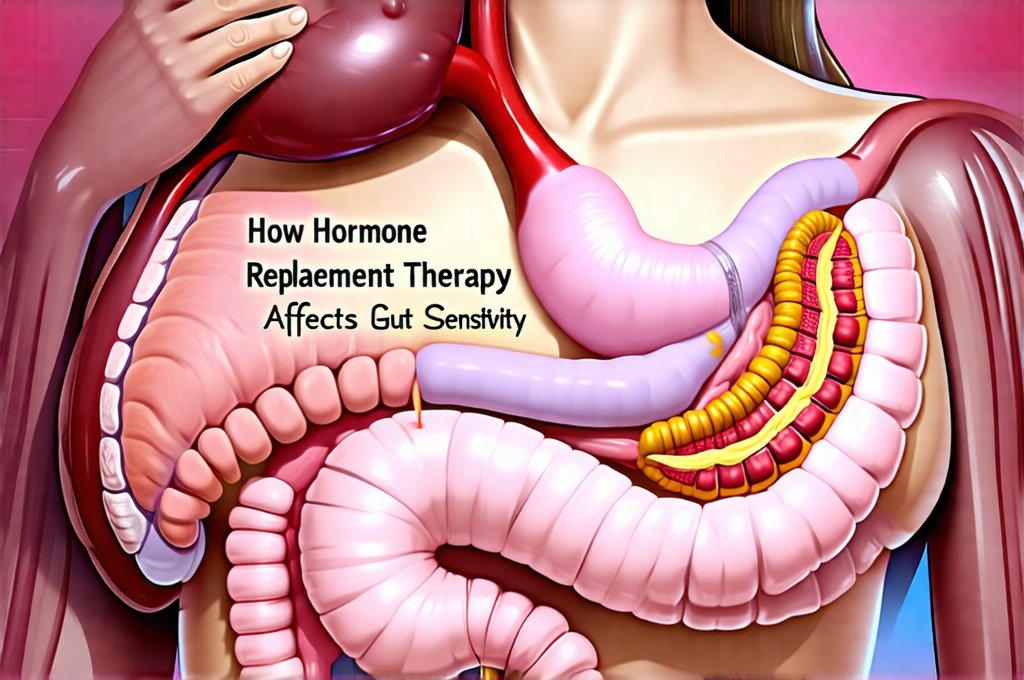Hormone Replacement Therapy (HRT) is a complex intervention, traditionally associated with managing menopausal symptoms in women, but increasingly used – and investigated – for broader hormonal imbalances impacting both men and women. While its effects on reproductive health, bone density, and cardiovascular function are widely discussed, the impact of HRT on gut sensitivity and overall gut health is an emerging area of research gaining significant attention. The gut, often referred to as our “second brain,” plays a critical role not just in digestion but also in immune regulation, mental wellbeing, and systemic inflammation. Understanding how modulating hormones can affect this vital organ system is paramount for holistic health management and optimizing treatment strategies.
The bidirectional relationship between the gut microbiome and hormonal systems is profound. Hormones influence gut motility, permeability, and microbial composition, while the gut microbiome, in turn, impacts hormone metabolism and signaling. This interplay creates a delicate balance that can be easily disrupted by factors like stress, diet, antibiotics, and – crucially – hormonal shifts. HRT introduces exogenous hormones which have the potential to significantly alter this existing equilibrium, leading to both positive and negative effects on gut sensitivity, depending on the type of hormone, dosage, individual characteristics, and pre-existing gut health status. Recognizing that HRT isn’t a one-size-fits-all solution is vital for personalized care approaches. Understanding how stress affects this delicate balance can be crucial.
The Gut-Hormone Axis & HRT Mechanisms
The intricate connection between hormones and gut function stems from several key mechanisms. Estrogen, for instance, significantly impacts intestinal permeability – often referred to as “leaky gut.” Fluctuations in estrogen levels can alter the tight junctions between intestinal cells, potentially allowing undigested food particles and bacterial toxins to enter the bloodstream, triggering immune responses and contributing to systemic inflammation. Progesterone, conversely, seems to strengthen these tight junctions, offering a protective effect. Testosterone, while often associated with muscle mass, also influences gut motility and microbial composition. HRT seeks to restore hormonal balance, but doing so can inadvertently disrupt the existing microbiome equilibrium if not carefully managed.
Furthermore, the gut microbiome itself plays a role in hormone metabolism – specifically estrobolome. This collection of gut bacteria is responsible for metabolizing estrogens, influencing their circulating levels and activity. Changes induced by HRT could alter estrobolome function, leading to imbalances in estrogen metabolism that impact not only systemic hormonal effects but also gut health. The type of HRT used—estrogen-only therapy versus combined estrogen-progesterone therapy—will have distinct effects on this process. Estrogen dominance (an imbalance where estrogen levels are high relative to progesterone) is often linked to increased gut permeability, while balanced hormone restoration aims for optimal gut function alongside symptom management. Acid affects the body in many ways beyond the stomach.
Finally, HRT can affect the vagus nerve, a crucial communication pathway between the gut and brain. Hormonal shifts can impact vagal tone – the level of activity in this nerve – which influences gut motility, inflammation, and even mental health. This interconnectedness means that changes in hormone levels, brought about by HRT, can ripple through the entire gut-brain axis, influencing a wide range of physiological processes.
Impact on Gut Microbiome Diversity
A healthy gut microbiome is characterized by diversity—a wide variety of bacterial species. This diversity provides resilience and stability to the gut ecosystem. HRT, depending on its composition and individual factors, can influence this diversity in several ways. Studies suggest that estrogen-only HRT might reduce microbial diversity, potentially increasing susceptibility to dysbiosis (an imbalance in the gut microbiome). The underlying mechanism is thought to be related to alterations in the gut environment caused by increased estrogen levels, favoring certain bacterial species over others. Weekend habits can also play a role in disrupting this balance.
Conversely, combined estrogen-progesterone therapy may have a more neutral or even beneficial effect on microbial diversity, possibly due to progesterone’s protective effects on intestinal barrier function and its potential to promote a more balanced microbiome composition. However, these findings are not conclusive and vary significantly between individuals. Factors like diet, lifestyle, and pre-existing gut health play a critical role in determining how HRT affects the microbiome. It’s important to remember that a reduction in diversity doesn’t automatically equate to negative consequences; it is the type of bacteria present and their overall function that are most important.
A personalized approach to HRT, incorporating pre-treatment gut microbiome analysis and tailored dietary/lifestyle interventions, could help mitigate potential adverse effects on microbial diversity. Probiotic supplementation might be considered as an adjunct therapy, but only under the guidance of a healthcare professional who understands both hormonal imbalances and gut health. The goal isn’t necessarily to achieve a specific level of diversity but rather to foster a balanced ecosystem that supports optimal digestion, immune function, and hormone metabolism. Reflux medication can also have an impact on gut health.
HRT & Intestinal Permeability (“Leaky Gut”)
As previously mentioned, fluctuations in estrogen levels can significantly impact intestinal permeability. Low estrogen levels, as seen during menopause, are associated with reduced gut barrier integrity, contributing to increased permeability. This “leaky gut” allows substances that shouldn’t normally pass through the intestinal wall into the bloodstream, triggering immune activation and chronic inflammation. HRT, particularly estrogen therapy, aims to restore estrogen levels, but it can paradoxically increase permeability in some individuals if not balanced with progesterone or other modulating factors.
The mechanism involves estrogen’s effect on tight junction proteins – the structures that hold intestinal cells together. High estrogen levels can disrupt these proteins, loosening the barrier and increasing permeability. However, it’s a complex relationship; certain types of estrogen (e.g., estradiol) may have different effects than others (e.g., estrone). Moreover, inflammation itself contributes to increased gut permeability, creating a vicious cycle where hormonal imbalances exacerbate gut issues and vice versa. Overeating affects the digestive system as well.
Addressing intestinal permeability alongside HRT is crucial for mitigating potential adverse effects. Strategies include dietary modifications (reducing inflammatory foods like processed sugars and gluten), stress management techniques, optimizing magnesium levels (vital for tight junction function) and potentially incorporating supplements that support gut barrier integrity – such as L-glutamine or zinc carnosine—under the supervision of a healthcare professional.
Managing Gut Sensitivity During HRT
Given the potential impact of HRT on gut sensitivity, proactive management is essential. A multifaceted approach focusing on dietary changes, lifestyle adjustments, and personalized supplementation can help minimize adverse effects and optimize gut health during hormone replacement therapy. Firstly, identifying and eliminating food sensitivities through an elimination diet or allergy testing can reduce inflammation and improve gut function. Secondly, incorporating prebiotic-rich foods (like garlic, onions, leeks, and bananas) supports the growth of beneficial gut bacteria, while probiotic-rich foods (yogurt, kefir, sauerkraut) introduce live microorganisms to the gut.
Stress management is paramount, as stress significantly impacts gut motility and permeability. Techniques like mindfulness meditation, yoga, and deep breathing exercises can help reduce cortisol levels – a stress hormone that negatively affects gut health. Thirdly, adequate hydration is vital for optimal digestion and gut function. Finally, working closely with healthcare professionals—including both a physician specializing in HRT and a registered dietitian or functional medicine practitioner—is key to developing a personalized plan tailored to individual needs and responses. This collaborative approach ensures that HRT is integrated into a holistic health strategy that prioritizes gut wellbeing alongside hormonal balance. Regular monitoring of symptoms, including digestive discomfort, bloating, and changes in bowel habits, is also crucial for adjusting treatment plans as needed. Acid affects more than just the stomach itself.


















